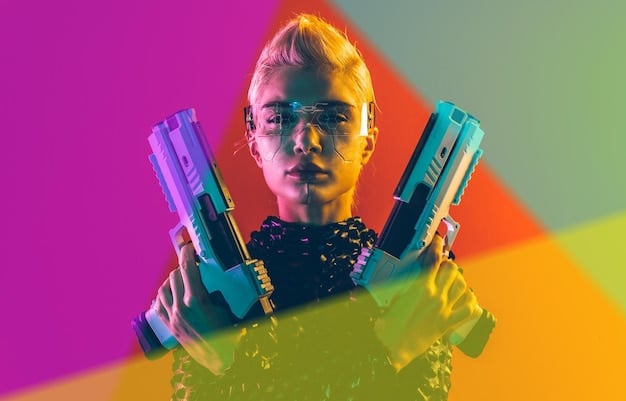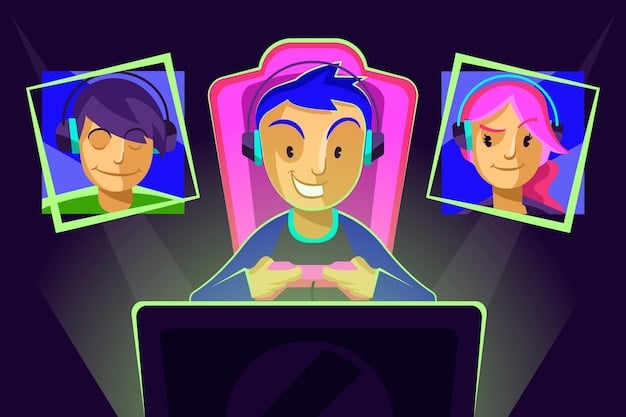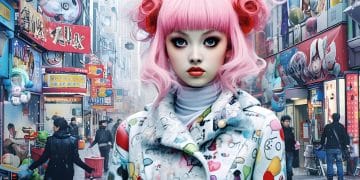Gaming Industry’s Pop Culture Takeover: US Trends

The gaming industry’s impact on pop culture in the US is evident through esports’ rise, game-inspired fashion, and characters crossing over into movies and music.
Dive into how the gaming industry’s impact on pop culture: a look at the latest trends in the US is reshaping entertainment, fashion, and beyond, defining a new era of digital influence.
The Evolution of Gaming and Pop Culture
Gaming has transformed from a niche hobby into a central pillar of pop culture. Its influence is felt across various creative sectors, impacting how we consume entertainment and interact with digital worlds.
This evolution is particularly evident in the United States, where gaming trends often set global standards.

Early Days of Gaming Influence
Initially, gaming’s impact was limited to arcades and home consoles. However, with the advent of the internet, gaming communities began to form, fostering a sense of belonging and shared culture.
Modern Integration
Today, gaming has seamlessly integrated into pop culture. From blockbuster movies based on video games to music artists collaborating with game developers, the boundaries between gaming and other forms of entertainment have blurred.
- Esports: Professional gaming has become a major spectator sport, attracting millions of viewers and generating substantial revenue.
- Streaming Culture: Platforms like Twitch and YouTube have enabled gamers to become influencers, shaping trends and opinions.
- Game-Inspired Fashion: Designers are increasingly drawing inspiration from video game aesthetics, creating clothing lines and accessories that appeal to gamers.
- Character Crossovers: Iconic video game characters are appearing in movies, TV shows, and even music videos, further cementing gaming’s place in mainstream culture.
The gaming industry’s influence on pop culture is undeniable, continuously evolving and shaping trends across the United States and beyond.
The Rise of Esports and Competitive Gaming in the US
Esports has witnessed explosive growth in the US, transforming from a niche activity into a mainstream cultural phenomenon. Professional gamers now compete for millions of dollars in prize money, attracting vast audiences both online and in physical arenas.
This rise has had a significant impact on how gaming is perceived and consumed, solidifying its position in pop culture.
Key Esports Titles
Several games dominate the esports scene in the US, each with its own dedicated fan base and professional leagues. These include titles like “League of Legends,” “Counter-Strike: Global Offensive,” and “Overwatch.”
The Business of Esports
The esports industry is a lucrative business, with revenue streams ranging from sponsorships and advertising to ticket sales and merchandise. Major brands are increasingly investing in esports teams and events, recognizing the marketing potential of reaching a young and engaged audience.
- Professional Leagues: Organized leagues such as the Overwatch League and the League of Legends Championship Series (LCS) provide structured competition and attract significant viewership.
- Sponsorships: Major brands like Red Bull, Intel, and Coca-Cola sponsor esports teams and events, further legitimizing the industry.
- Streaming Platforms: Twitch and YouTube remain the primary platforms for watching esports, enabling viewers to interact with players and commentators in real-time.
- College Esports: Many universities in the US have established esports programs, offering scholarships to talented gamers and fostering a pipeline for professional talent.
The rise of esports and competitive gaming in the US has not only transformed the gaming landscape but has also had a profound impact on pop culture, influencing fashion, music, and entertainment trends.
Gaming and Music: A Synergistic Relationship
The connection between gaming and music has become increasingly intertwined, with artists and game developers collaborating to create immersive and engaging experiences. Music is no longer just a backdrop to gameplay; it’s an integral part of the gaming experience.
This synergy is particularly evident in the US, where gaming and music festivals are gaining popularity.
Soundtracks and Original Scores
Many video games feature original soundtracks and scores that enhance the emotional impact of the gameplay. Composers are now recognized for their contributions to the gaming industry, with their music often performed in concert halls.
Virtual Concerts
Virtual concerts within games have become a popular way for artists to reach new audiences. Games like “Fortnite” and “Minecraft” have hosted virtual performances by popular musicians, attracting millions of viewers.

- Collaborations: Music artists are collaborating with game developers to create custom songs and in-game content, blurring the lines between the two industries.
- Streaming: Gamers often stream their gameplay with music playing in the background, introducing their audience to new artists and genres.
- Game-Inspired Music: Musicians are drawing inspiration from video game themes and aesthetics, creating music that appeals to gamers and non-gamers alike.
- Interactive Music: Some games feature interactive music systems that change based on the player’s actions, creating a dynamic and personalized gaming experience.
The relationship between gaming and music is symbiotic, with each industry benefiting from the other’s creative energy and cultural influence. This synergy is shaping the future of entertainment in the US and beyond.
The Influence of Gaming on Fashion and Style
Gaming’s influence on fashion and style is becoming increasingly pronounced, with designers drawing inspiration from video game characters, aesthetics, and virtual worlds. This trend is evident in the US, where game-inspired clothing lines and accessories are gaining popularity.
Gaming is a cultural phenomenon, shaping trends across various creative sectors, including fashion.
Cosplay and Streetwear
Cosplay, the practice of dressing up as video game characters, has become a popular form of self-expression and creative outlet. Streetwear brands are also incorporating gaming-inspired designs into their clothing lines, appealing to a young and tech-savvy audience.
High Fashion
High-fashion designers are also taking notice of gaming’s influence, creating collections that incorporate elements of virtual worlds and digital aesthetics. These designs often push the boundaries of traditional fashion, exploring new materials and silhouettes.
- Character-Inspired Designs: Clothing lines featuring iconic video game characters are becoming increasingly popular, allowing fans to express their love for their favorite games.
- Virtual Fashion: Designers are creating virtual clothing and accessories for use in online games and virtual worlds, opening up new possibilities for self-expression.
- Tech Accessories: Gaming-inspired tech accessories, such as headsets, controllers, and gaming mice, are also becoming fashion statements, with designers creating stylish and functional designs.
- Gaming Conventions: Events like Comic-Con and PAX serve as showcases for gaming-inspired fashion, with cosplayers and designers displaying their latest creations.
The influence of gaming on fashion and style is a testament to the industry’s cultural impact. As gaming continues to evolve, its influence on fashion will likely grow, shaping the way we dress and express ourselves.
Gaming Conventions and Events: Centers of Pop Culture
Gaming conventions and events serve as major hubs for pop culture, bringing together gamers, developers, artists, and fans from around the world. These events provide a platform for showcasing new games, technologies, and trends, shaping the future of the industry.
In the US, gaming conventions are particularly significant, attracting millions of attendees and generating substantial economic impact.
Major US Gaming Conventions
Several major gaming conventions take place in the US each year, each with its own unique focus and audience. These include events like E3, PAX, and Comic-Con, which attract gamers, industry professionals, and media outlets from around the world.
The Convention Experience
Attending a gaming convention is an immersive experience, offering attendees the chance to play unreleased games, meet developers and artists, attend panels and workshops, and connect with fellow gamers.
- Game Demos: Conventions provide a platform for developers to showcase their latest games, allowing attendees to play demos and provide feedback.
- Cosplay Competitions: Cosplay competitions are a popular feature of gaming conventions, with cosplayers showcasing their elaborate costumes and creative skills.
- Industry Panels: Industry panels and workshops offer attendees insights into the gaming industry, covering topics ranging from game development to esports.
- Networking Opportunities: Conventions provide valuable networking opportunities for gamers, developers, and industry professionals, fostering collaboration and innovation.
Gaming conventions and events are essential centers of pop culture, promoting innovation, creativity, and community within the gaming industry. These events play a crucial role in shaping the future of gaming and its impact on society.
The Future of Gaming’s Impact on US Pop Culture
The gaming industry’s impact on pop culture in the US is poised to grow even further, with new technologies, trends, and platforms emerging to shape the future of entertainment. As gaming becomes more integrated into our daily lives, its influence on music, fashion, and other creative sectors will continue to expand.
This future is shaped by innovation, community, and a growing recognition of gaming’s cultural significance.
Virtual Reality and Augmented Reality
Virtual reality (VR) and augmented reality (AR) technologies are poised to transform the gaming experience, offering immersive and interactive gameplay. As VR and AR headsets become more affordable and accessible, they will likely become a major part of the gaming landscape.
Cloud Gaming
Cloud gaming platforms are allowing gamers to stream games to their devices without the need for expensive hardware. This technology is making gaming more accessible to a wider audience, particularly in areas with limited internet infrastructure.
- Artificial Intelligence: AI is being used to create more realistic and challenging game experiences, with AI-powered characters and environments that adapt to the player’s actions.
- Social Gaming: Social gaming platforms are connecting gamers from around the world, fostering communities and enabling collaborative gameplay.
- Mobile Gaming: Mobile gaming continues to grow, with smartphones and tablets becoming powerful gaming devices. Mobile games are now a major part of the gaming industry, attracting a diverse audience.
- Cross-Platform Play: Cross-platform play is becoming more common, allowing gamers to play with friends on different devices and platforms.
The future of gaming’s impact on US pop culture is bright, with new technologies and trends poised to shape the industry and its influence on society. As gaming continues to evolve, its role in entertainment, education, and communication will likely grow even further.
| Key Point | Brief Description |
|---|---|
| 🎮 Esports Rise | Competitive gaming is a major spectator sport. |
| 🎧 Gaming & Music | Collaborations and virtual concerts enhance gaming experiences. |
| 👕 Gaming Fashion | Game-inspired clothing lines gain popularity. |
| 🎉 Gaming Events | Conventions showcase new games and community. |
Frequently Asked Questions
▼
Esports has seen massive growth, evolving into a professional spectator sport with significant revenue streams from sponsorships, advertising, and ticket sales, attracting millions of viewers.
▼
Music is integral, with artists and game developers collaborating on original soundtracks and virtual concerts within games. This enhances the gaming experience and reaches new audiences.
▼
Designers are drawing inspiration from video game characters and aesthetics, creating clothing lines and accessories. Cosplay and streetwear often feature gaming-inspired designs, appealing to a tech-savvy audience.
▼
Gaming conventions serve as major hubs for pop culture, bringing together gamers, developers, and fans. They showcase new games, technologies, and trends, influencing the industry’s future and generating economic impact.
▼
Virtual and augmented reality, cloud gaming, artificial intelligence, social gaming, and mobile gaming are all expected to play significant roles, expanding gaming’s reach and influence across various sectors.
Conclusion
The gaming industry’s influence on US pop culture is undeniable, shaping entertainment, fashion, and music. As technology evolves, gaming’s impact will continue to grow, further blurring the lines between digital and real-world experiences.





